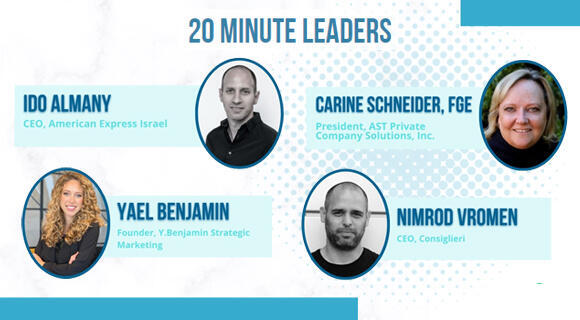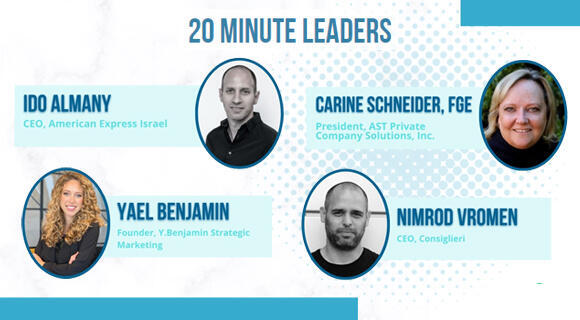
20-Minute Leaders
“In these times of distress, communicate even more than you used to in the past.”
Michael Matias is joined by a panel including Carine Schneider, president of AST Private Company Solutions; Nimrod Vromen, co-founder and CEO of Consiglieri; Ido Almany, CEO of American Express in Israel; Yael Benjamin, founder of Startup Snapshot
The market has shifted recently, bringing change and challenge to startups, according to new data. In April 2022, the biggest concern of founders was hiring and retention, but by June, they were more worried about fundraising, shares Yael Benjamin, founder of Startup Snapshot, which collects data from 450 founders and employees. Though the change has begun, it will take a few months for entrepreneurs to understand how to deal with the challenges, says Ido Almany, CEO of American Express in Israel. Carine Schneider, president of AST Private Company Solutions, agrees that seismic shifts are coming and advises founders to pay attention to be sure their company is part of the new landscape. Companies who were planning to raise money soon might find that very difficult, but that provides opportunities for M&As, explains Nimrod Vromen, co-founder and CEO of Consiglieri. The panelists agree that communication between executives and employees is key to keeping talent on board and moving in a new direction.
Welcome to another awesome panel. You're all involved with the really interesting report that Yael Benjamin has put together, but I'd love to get to know you first.
Carine Schneider: I'm the president of AST Private Company Solutions. I was a partner at PwC, was CEO of a number of tech companies, and was president of NASDAQ Private Market before I came to AST.
Nimrod Vromen: I've been a corporate lawyer for over 15 years, representing hundreds of startups. In the last two years, I co-founded a consulting firm for startups and entrepreneurs called Consiglieri.
Ido Almany: I'm the CEO of American Express in Israel. I've been mentoring lots of startups in multiple accelerators over the past eight years or so.
Yael Benjamin: Startup Snapshot is an initiative I started about three years ago. The whole purpose is to increase transparency in the tech ecosystem. Why not share our data, share our insights, and everyone can benefit and make much better decisions going forward. We really wanted to see how the whole workforce market in the startup ecosystem was really changing the past couple of months. We collected data from 450 founders and their employees. In the past couple of weeks, we're seeing a huge shift in the ecosystem.
In April, when we asked founders, hiring and employee retention was the number one challenge for the majority. At the end of May, beginning of June, fundraising became the number one concern for founders: 74% said that they're really worried about their ability to raise their next round of funding. And 68% of startups changed their hiring strategy. They either froze it or really slowed down hiring.
2 View gallery


Carine Schneider, president of AST Private Company Solutions; Nimrod Vromen, co-founder and CEO of Consiglieri; Ido Almany, CEO of American Express in Israel; Yael Benjamin, founder of Startup Snapshot
(Photo: N/A)
How the hell do we get to a point where over a period of weeks, you have a shift in strategy that so closely resembles what happened in 2008 and the dot-com bubble? What happened here?
Schneider: From a US perspective, a couple of things. I think interest rate changes have had a massive impact. You layer on top of that what's happened in Ukraine and the inflation issues, and all of a sudden, you've got micro and macro issues hitting each other at the same time. I think we didn't have that in 2008. I think, optimistically, that because of COVID, we're actually financially in much better space. Regular retail individuals have more savings. The unemployment rate is so low.
Almany: I think compared to 2008, and also COVID, it's more systemic this time. It's not confined into a specific sector. The implications are more broad. It's impacting on a much broader, systemic scale; that's why we think it will last longer.
Vromen: I do believe that there are differences to 2008 in the sense that that one was sourced around specific practices in spaces that are not so related to high tech companies. In this specific case, I think tech is going to feel this big time. During COVID trillions of dollars of money was put into the market to get it to the needy through trickle down policies. What happens is that people who get the money, like pension funds or larger corporations, and use it to incentivize other companies, they will have agency problems. They're managing the money, and they might be incentivized to invest it in high-risk targets such as tech companies. When agents of money are investing in tech companies and they're competing over a limited supply of companies of innovation, they will overvalue the companies.
Once pessimism and realism kicks in—the war in Ukraine, several botched IPOs, I think that We Work is a culprit—then people are saying, "Hey, do these tech companies know what they're doing?" Then that starts the domino effect and people start evaluating the companies again with their right valuations. The market is going to get into a situation where there are going to be healthy companies that raised a lot of money during the last two years, and there are going to be companies that didn't make it, that the runway is now or in the next few months and they have to do something.
Schneider: Having seen 2001, 2008, COVID, and now this, you can draw some parallels. About two years ago, I remember talking to the managing partner of a large-scale venture capital firm. He said, "There's too much money. We don't know what to do with this money." My antenna goes up when I start to hear more than three people say the valuations are just not supported, so we’re going to see a major reset. I live here in the Valley, the summer is here and people are going to take the next three months off. So for these firms who are thinking, "I'm going to raise money in June or July or close in August," it's not happening. The ones who are on the edge are not going to make it.
I'm pretty sure almost every firm kept making investments at 35 million pre-money seed rounds even though they may know that it's not reasonable. How do we explain that?
Almany: Because the nature of markets are not fully reasonable. The same markets are cyclical. So we understand it's coming. There was a feeling for the past year and a half that the markets and the valuations are too big. But no one knows the exact date, so there is a pressure to continue investing because you don't know if it's in a week, two months, or two years, and you feel that you're missing investments.
Benjamin: I don't know how dramatic this is going to be, but I think that in today's market, the rules of the games have changed. A very large percent of startups in the past couple weeks said that their focus was on securing sales much faster. It's a very healthy place to get to where startups have to show a business model—some revenue, market validation, client validation—much faster in the process. I think that is a healthy correction to the market.
Almany: Fully agree. I think founders now need to change their focus. They were focused in the past year and a half on growth. Now they understand that they need to manage the runway.
Benjamin: Nimrod and Carine, we spoke about what kind of opportunities are coming out of here. The research found that a large percent of startups think that there's an opportunity to snatch up top talent from the public companies. The stocks really went down. The time until their stocks come back up to what they were before could be a couple of years. So the risk level that they're willing to take, it's becoming much similar to a startup in the end. Carine and Nimrod, we also spoke a lot about the M&A market.
Schneider: I think the acquihire, at least, in San Francisco, everybody is shedding employees. It's a good time to say, "I'm going to get rid of five or 10% of people who I was not crazy about anyway and scale back a little bit." Those people are on the market. But I also think these small startups are going to be looking for people to buy them. Larger companies are going to have a great buying opportunity.
Vromen: The startups that raised money, they're alive. The ones that didn't raise money and the runway’s in the upcoming six to 10 months and their investors are not going to follow on—because their investors also have to decide who they're going to save, in a sense—so the ones that aren't going to be saved are dead. That means that they're going to be up for sale for pretty much their debt.
What this does for companies that did raise 20 million and up is it gives them an opportunity to buy companies, startup companies, for their outstanding working capital when it's left. There's an opportunity for small M&As. If you structure them right, then these companies can come out really strong from the next year or two. When I mean "structure them right,” that's not a small thing.
Do you feel that there's a common understanding that there are these various opportunities that founders of series-B or series-C companies can now actually reason through?
Almany: I don't think all founders understand that that's even a possibility going forward. I think we'll experience a few months now where most founders are scrambling to understand how they're dealing with this crisis. Some of them will understand that they don't have a runway and will start reaching out. Those that understand that they have the ability to weather the storm, they'll look at the opportunities.
Vromen: I love where investors are investing other people's money; they might overvalue a target to get the deal. It's not malicious or nefarious. It's just the way that people work when they're not making a decision on their own capital. Same goes for a CFO of a startup who might think, "This is going to be a cool experience for me to buy some companies if I can get them." There's an opportunity for them.
Schneider: You're starting to see a whole new and different way when looking at these acquisitions. Private equity now is circling some of these companies that traditionally, they wouldn’t have looked at. But now, they're starting to say, "Who in my portfolio could benefit from this?”
If we're looking from a founder perspective, if we're now in a position where we have the runway and we have maybe an opportunity to put our heads down and for the next 12 months not even think about the market, just build the product. Is that a reasonable strategy for a founder?
Schneider: I think you kind of have to do both unfortunately, and this is what happens with startups. If you've got the money and you've got the talent, I think, heads down, spend the next 12 months growing, building, and developing. But I think the CEOs of these companies need to be spending 25% of their time looking at what's out there. You've got to be looking for the opportunities, for tech, people, or client acquisition. You've got to be doing partnerships. If you're the CEO and you think you don't have to worry about it for 12 months, I think you're going to wake up in 12 months and either have lost some great opportunities or be in a lot of trouble. You just cannot avoid what's going on here. There's going to be some seismic shifts. You're going to have to make sure that your company is part of that seismic shift.
Almany: Exactly. What I'd like to add is the fact that I think the situation is even more complex for founders now. In the past year, they focused primarily on raising funds. Now, they also need to look at partnerships and need to maintain the connection with potential fundraising for the next round. They also need to understand the market. They also need to manage their talent. If the feeling in the market is that all valuations are down, their top talent understands that they have a potential to go to a new startup and enjoy the hockey stick there. They need to fully communicate what they are feeling from the VCs and about their current valuation to their top talent, explaining to them that their stock options are worth something and the company is on a good trajectory.
Benjamin: I think that that's a key that founders have to focus on in the next couple months: how do I tell this story to my employees to really get them on board and focused in the direction that we're moving this ship now? There's a huge asymmetry of information between founders and their employees. The founders are really understanding that there's a huge shift in the market. But employees are still living in the market of 2021: 68% said that they're not even worried about their future in the company and what's happening going forward. Employees aren't part of the conversation behind closed doors with investors, with clients. They don't know about how the company's doing as a whole.
Almany: That's part of the responsibility of the boards. Because it comes with experience that you need, in these times of distress, to communicate even more than you used to communicate in the past even if you feel that you don't have anything to communicate. So updating your top talent on meeting a VC and understanding that a valuation is 80% of what you experienced, but the feeling in the media is that valuation was cut in half is a good thing to communicate to your top talent. I think the boards will have to step in and will have to mentor their founders going through this process.
Vromen: Absolutely. You asked earlier what is the behavioral shift, like what triggers the crisis or the downtick. Within a company, in its culture, it's going to be one small event that sends the employees into a frenzy. Let's say you're looking at the cohort of employees in your company to whom you granted options in the last two years. They're going to get those options at an exercise price reflecting the fair market value of the shares. If they were granted in the last two years, that exercise price is high. One of these people—it takes one—is going to leave in the next few months, and they're going to realize, when they need to pony up the money for the exercise price, that their options are out of the money. When they find out, they're going to be in dismay and they're going to tell their friends. That sort of cooler talk around that could create a real forest fire within your company.
If you look at WeWork, when you look at "WeCrashed," all the employees are pissed off. But if you listen to Adam Neumann in an interview, he's going to say, "No, you're missing the point. Here's where I missed. I missed on the employees that I hired prior to the IPO and gave them a really high exercise price." Those people leaked all the bad things into the press. Otherwise, the early employees still made hundreds of millions in the small IPO that the company did. If you don't control the narrative, you don't communicate, that's how your company's going to get hurt in this process.
Michael Matias, Forbes 30 Under 30, is the author of Age is Only an Int: Lessons I Learned as a Young Entrepreneur. He studies Artificial Intelligence at Stanford University, is a Venture Partner at J-Ventures and was an engineer at Hippo Insurance. Matias previously served as an officer in the 8200 unit. 20MinuteLeaders is a tech entrepreneurship interview series featuring one-on-one interviews with fascinating founders, innovators and thought leaders sharing their journeys and experiences.
Contributing editors: Michael Matias, Megan Ryan














